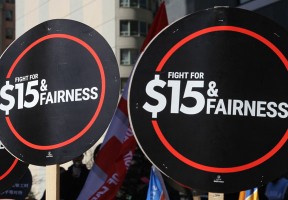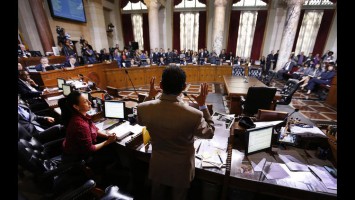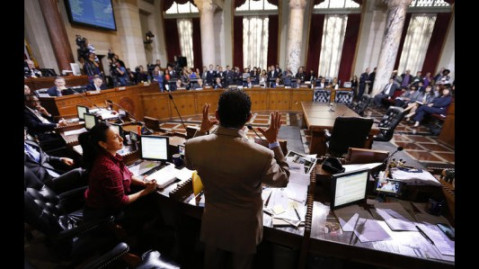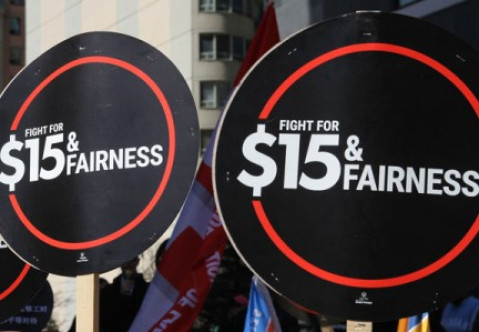Widgetized Section
Go to Admin » Appearance » Widgets » and move Gabfire Widget: Social into that MastheadOverlay zone
Public Administration and the Fight Against Economic Inequality
The views expressed are those of the author and do not necessarily reflect the views of ASPA as an organization.
By Ben Tafoya
July 10, 2015
In the public realm no issue is getting more attention than economic inequality. In the absence of broad action at the federal level to change tax and spending policies, the opportunity for bold action falls to actors at the state and local level. As public administrators, we have the capability to design new approaches to promote social solidarity and improve living conditions for many of our fellow citizens.
 Over the last few years, a major focus of this activity has come from the push for a higher minimum wage in cities and states. Today, 29 states and Washington, D.C. have enacted a higher minimum wage than the federal minimum of $7.25 as set by Congress in 2009. Additionally, several large cities and counties have their own standard that go over $15 per hour for some classes of workers. In many of these locations, the concern behind the higher minimum wage is the higher cost-of-living in the areas.
Over the last few years, a major focus of this activity has come from the push for a higher minimum wage in cities and states. Today, 29 states and Washington, D.C. have enacted a higher minimum wage than the federal minimum of $7.25 as set by Congress in 2009. Additionally, several large cities and counties have their own standard that go over $15 per hour for some classes of workers. In many of these locations, the concern behind the higher minimum wage is the higher cost-of-living in the areas.
Higher wages offer a path to a broader prosperity that works well for the communities. The concern is whether these efforts discourage some employment at the margin and economists are split on the impacts. We do know that the effort to raise the wage helps those at the lower end of the wage scale achieve some income growth.
Another effort underway is mandated paid sick leave. As of this date, there have been few state level initiatives in this area. Among the recent efforts was the passage of paid sick leave based on a citizen petition in Massachusetts. As with many initiatives, this leaves much to work through for the implementation team from the state Attorney General’s office. Broadly it offers a system of 40 hours of sick leave every year. Supporters pointed to the family friendly nature of this move as it allows for the use of the sick time to care for children, spouses or other parent of a spouse. The city of Boston has taken this a step further. Mayor Marty Walsh has signed an order allowing for paid parental leave for employees of the city.

To some extent the political desire for these types of laws outstrips the capability to plan and move them through the normal legislative process. Minimum wage laws and paid sick leave have become frequent objects of citizens’ legislating through initiative and referendum. In order for these efforts to accomplish their goals, public administrators must be actively engaged in the design and implementation of enforcement efforts.
Harold Meyerson, writing in The American Prospect, relates the efforts by California based immigrant and labor rights groups to pressure the state and cities to provide proper protection for low wage workers. Proper classification as employees (to allow for the protections to be meaningful) and then wage and hour enforcement are critical steps toward the implementation of the voter efforts.
Meyerson also writes about the effort to condition state and local tax breaks (particularly for economic development) on the improvement of employment opportunities, wage rates and environmental standards. State and local governments offer billions of dollars yearly to provide incentives to firms to locate or expand operations. As documented by Good Jobs First, few states or localities do a good job evaluating the effectiveness of these programs. The Government Accounting Standards Board is working toward a system of comprehensive disclosure by entities offering such incentives in order to provide greater transparency. Combining conditions and disclosure will help improve the lot of those with little power to negotiate on their own behalf.
Housing cost is one of the most dramatic areas of differential between economic classes. Analysis by the National Low Income Housing Coalition, in their report “Out of Reach 2015,” shows that from the end of the recession in 2009 to the end of 2014, rents have risen 15 percent on a nationwide basis. In specific cities the situation is even more dramatic. Nationally the housing wage (defined as 30 percent of income required for a modest two-bedroom apartment) is over $40,000 per year. For Washington, D.C. the housing wage is near $58,000 per year while for Seattle it is almost $57,000 and Boston even higher at $60,000. In a subsequent column I will discuss some of the actions being taken to address the silent housing crisis in America’s cities.
Public administrators have tools that can help improve the standard of living of those in the bottom 80 percent of income distributions. Through actions that improve wages and working conditions they can lift more people up so they can make a good quality life for workers and their families. Thorough examination of the expense side, such as housing costs, can contribute to making communities accessible for more. By anticipating the need and designing solutions to promote these goals we can be effective policy makers.
Author: Dr. Ben Tafoya is the undergraduate program director in the School of Public Policy and Administration at Walden University. He served as a local elected official in Massachusetts for nine years and is still active in governmental affairs. Ben has his doctorate in law and policy from Northeastern University and a bachelor’s degree in economics from Georgetown University.







Follow Us!